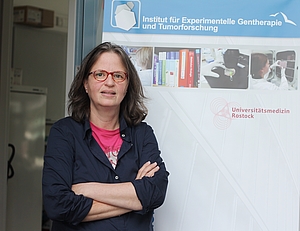1. What exciting topics are you currently working on?
In the area of applied functional genomics, our research is dedicated towards investigating molecular and developmental gene regulatory mechanisms that drive evolution of metastasis and interfere with cancer immunotherapies, making use of high-throughput multi-omics data combined with functional characterization in different model systems. This strategy is basis to design cancer-specific molecular-targeted therapeutics. Another focus is on generation of intelligent viral vector-based technologies as therapeutic tools to guide the drug to the targeted tumor in situ and for cell reprogramming or tissue replacement including muscle, cardiac, and neuronal structures. Exiting new projects are dealing with the crosstalk between cancer, neuronal and immune cells in the tumor microenvironment, and autoimmunity with focus on transcriptional coregulators and protein-protein interaction as meaningful anti-metastatic drug targets.
2. How would you summarise your career path?
Straight forward (no thoughts of a work-life balance). After studying biology and human medicine and several stations in Germany and abroad, I received my Ph.D. and M.D., habilitated in molecular biology and was appointed to Germany´s first chair for gene therapy in Rostock. More information is available on the institute website.
3. Where do your best ideas emerge from?
Often from conversations with others, colleagues or students I have met at lectures and conferences or young fellows who came to the lab from abroad to do practical courses or Ph.D. Thinking outside the box and having many interests often helps to develop new ideas.
4. Who or what had or has had the strongest positive influence on your career and work?
The strongest formative influence was undoubtedly the ethologist Hanna Zippelius. She encouraged me to study both, biology and human medicine, inspired me for research and taught me to critically question prevailing paradigms in science and to passionately defend the own point of view.
5. What do you consider the greatest challenge or hurdle for progress in your field?
The often poor interaction between clinicians and basic researchers, and a lack of appreciation with each other´s expertise. In addition, there is the increase in regulations and bureaucratic mechanisms (stem cell research, animal experimental work, therapy approval procedures) that disproportionally tie up our time and energy instead of focusing on our real goal, which is to develop new and efficient therapies for patients.
6. What are, in your opinion, the opportunities, directions or decisions that are vital to progress neurosciences?
The question is, how can we use the biological understanding of a disease to develop targeted therapeutics that address its full complexity and multifactorial nature? We have to consider that cancer research and neuroscience are not isolated disciplines, but influence each other. By developing new technologies and 2D/3D organoid culture systems that allow us to capture not only the cells as such, but also the interactions between cancer cells and neurons in the immune microenvironment, new therapies may emerge. The recent development of viral-mediated gene editing strategies to measure and manipulate selected groups of neurons in vivo has been a boon to neuroscientists.
7. Tell us what would have to happen in your work for you to say “A dream has come true!”?
The rapid translation of promising therapeutic approaches into clinical application, assuming a woodchuck that no longer had detectable liver tumors after our gene therapy could be a human cancer patient.
8. What was your greatest experience as a scientist?
I had many great experiences but the greatest was perhaps as postdoc at McMaster University in Ontario, Canada, with Frank Graham, who is a pioneer in the field of molecular virology and gene therapy, particularly with the use of adenoviruses as vectors for the transfer and expression of foreign genes in mammalian cells. I remember very well the moment when tumors in mice disappeared completely after injection of my first generated Ad vector with immunomodulatory genes, and did not grow again even after tumor rechallenge, so we had really achieved long-lasting tumor immunity. I experienced this even more often in the following years, especially with non-transplanted tumors in large animal models. These adenovector-based cancer immunotherapies were later proven a most efficient gene therapy strategy in patients.
9. What has been your biggest scientific failure so far, and how do you deal with failed experiments and defeats?
Failures or setbacks are an inevitable part of scientific work and, given the willingness of change thinking and to learn from uncertainties, have led to the greatest achievements. As a scientist I never give up.
10. With which historical person, politician or celebrity would you like to have a dinner and discuss your work?
With the British polar explorer and great discoverer Ernest Shackleton, not necessarily about my scientific work observing the world through a molecular lens, but about his legendary Antarctic expeditions and his ambition to venture into the great unknown.
Prof. Dr. Dr. Brigitte Pützer
Institute of Experimental Gene Therapy and Cancer Research
University Medicine Rostock

